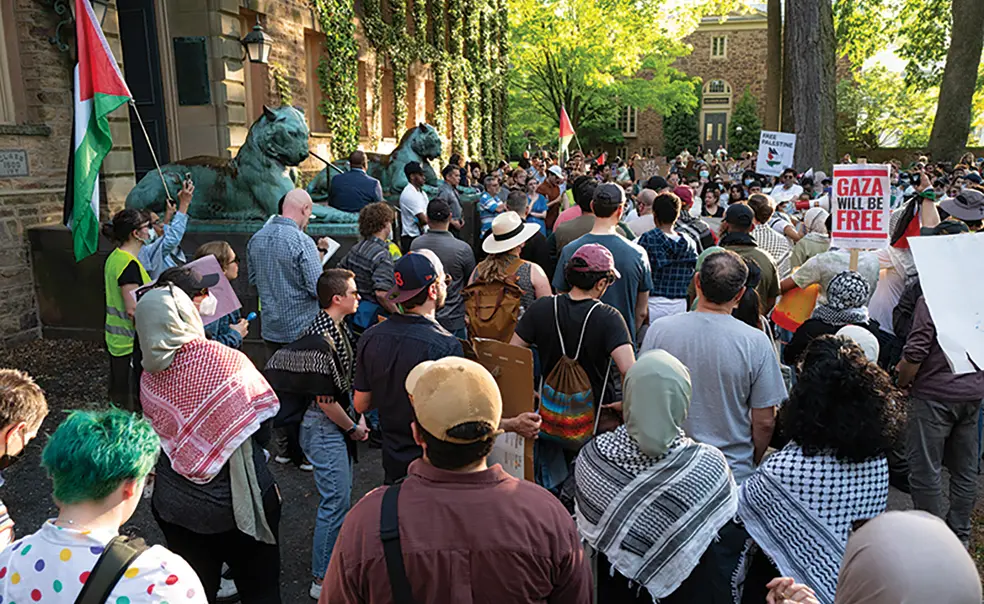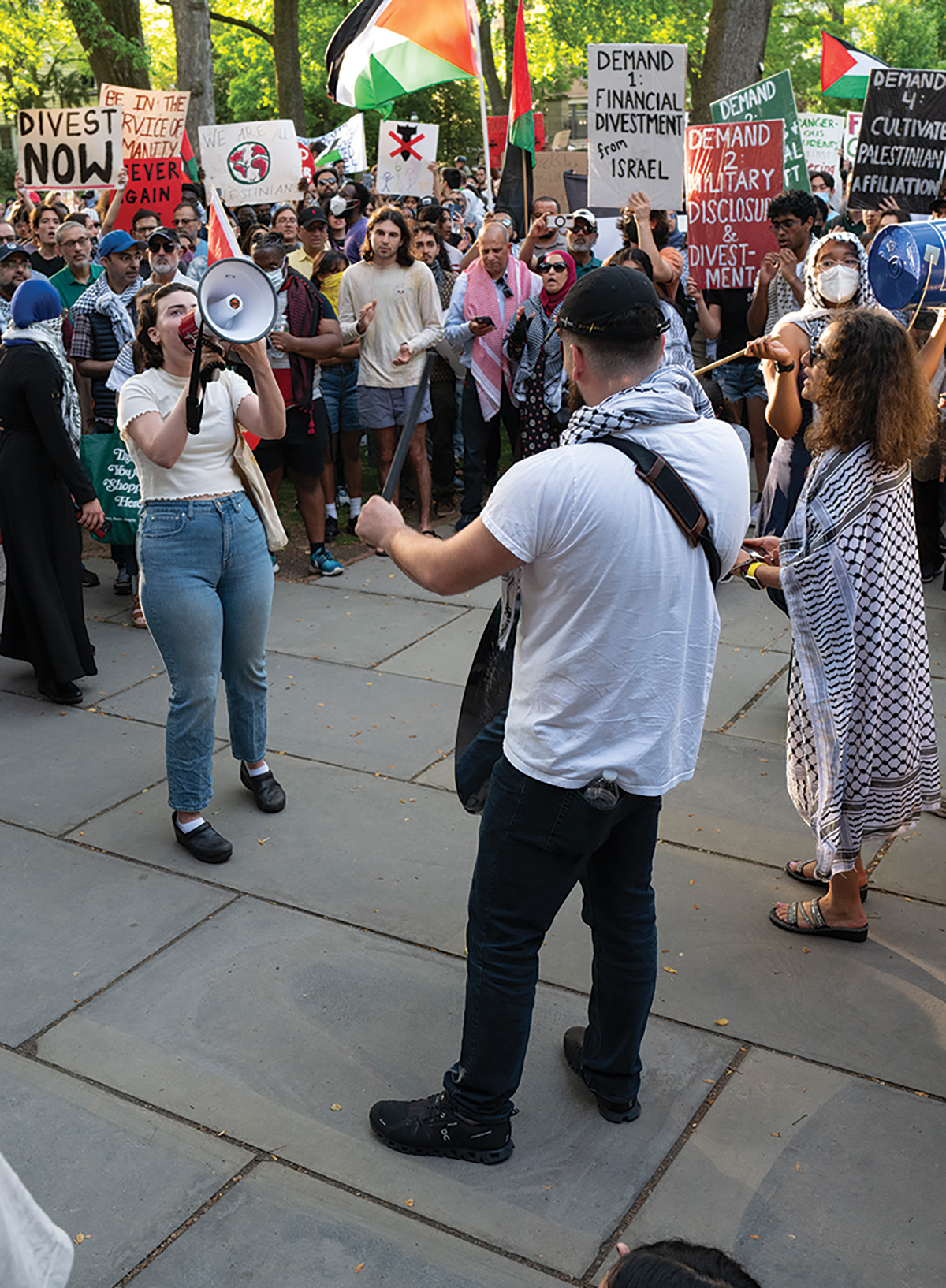21 Days of Protest: The Pro-Palestinian Encampment, Occupation, and Arrests
Princeton had largely avoided the national spotlight and major clashes on campus until the morning of April 25
During the three weeks that pro-Palestinian protesters established an encampment from late April to May, 15 Princeton University community members were arrested, others fasted for more than a week in a hunger strike, and University property was damaged in some of the most pronounced moments of tension on campus since the Oct. 7 attacks by Hamas on Israel and the ensuing war in Gaza. After a May 15 rally, protesters cleared out their encampment on Cannon Green, about 36 hours after Princeton had put up signs announcing the closure of the space in preparation for Class Day and the Graduate School hooding ceremony.
Led by the group Princeton Israeli Apartheid Divest (PIAD), protesters demanded that Princeton: financially divest and dissociate from companies that “profit from or engage in the State of Israel’s ongoing military campaign” in Gaza, end research funded by the U.S. Department of Defense, boycott Israeli institutions and end study abroad programs in Israel, affiliate with Palestinian institutions directly, release a public statement calling for an immediate ceasefire in Gaza and condemning Israel, and provide amnesty for all students involved in the protests.
Princeton had largely avoided the national spotlight and major clashes on campus until the morning of April 25, when pro-Palestinian protesters first attempted to encamp in McCosh Courtyard; two graduate students, Achinthya Sivalingam and Hassan Sayed, were quickly arrested for refusing to adhere to warnings from the Department of Public Safety to remove their tents, while remaining protesters packed away their camping gear and continued the demonstration as a round-the-clock sit-in during the last few days of classes, reading period, and finals. (University guidelines prohibit protesters from sleeping in outdoor spaces on campus.)
“We’re speaking out in solidarity with Palestine,” Urvi, a first-year Ph.D. student who asked to be identified only by her first name, told PAW on April 25.
Things came to a head four days later when 13 people — primarily Princeton undergraduates and graduate students but also a postdoc researcher and a Princeton Theological Seminary student who was enrolled in a University course — occupied Clio Hall, which houses the offices of the Graduate School, for more than two hours while about 500 others rallied, chanted, and linked arm-in-arm around the entrances and exits of the building.
After two of the protesters were removed from the building and put on a nearby University bus by Public Safety officers, the crowd banged on the bus, cracking the glass on a side door, and blocked its path. They chanted, “Admin, admin, talk to us. We hate your f------ bus.”
All 13 protesters from the occupation were eventually arrested, given summonses for trespassing, and barred from campus pending disciplinary proceedings. President Christopher Eisgruber ’83 wrote in an email to the community that night that the occupation was “completely unacceptable” and “deeply unsettling” to staff members in Clio.
Directly after the attempted takeover, the protesters moved their encampment to Cannon Green.
Though Stephen Bartell ’25, student president of the Center for Jewish Life, told PAW via email in mid-May that he remained “fully comfortable walking past the sit-in,” he also said the Clio Hall incident was “incredibly intense and shook many students in ways that we haven’t really seen up until this point.”
PIAD has said in open letters and on social media that they are peaceful, though not everyone agrees. In particular, a Hezbollah flag that was spotted on the first day of the encampment caused alarm (the U.S. Department of State classifies Hezbollah as a foreign terrorist organization), and some of the protesters’ chants have compared police to the KKK and referenced “the intifada,” which some view as an incitement to violence, and “one solution,” which some believe alludes to Nazi Germany’s Final Solution.
Through daily programming, the protesters hosted speakers, curated a “liberation library,” and collected what seemed to be an enormous amount of food, thanks at least in part to solicited donations. They also held regular rallies, drawing at times up to 600 people, including many members of the news media and, at one event, students from Princeton High School who attended to show solidarity. At another rally, University students previously arrested on campus addressed their protesting peers from the sidewalk on Nassau Street, just outside FitzRandolph Gate.
More than a dozen Princeton students began a hunger strike on May 3; nine days later, PIAD announced the original strikers would be replaced by a second wave of seven new strikers “due to health concerns.” (According to PIAD, one of the original strikers was hospitalized after six days of fasting). Some faculty members who have been supportive of the protests (see story on page 11) participated in 24-hour solidarity hunger strikes.
Divestment from Israel seemed to lead the protesters’ list of demands. As the Clio Hall occupation was starting, students from the encampment disrupted the Council of the Princeton University Community (CPUC) at its final meeting of the academic year. Professor Jay Groves, chair of the resources committee — which makes recommendations on divestment to the Board of Trustees — reported the committee had not received any divestment proposals this year, though he had received emails and phone calls on the day of the meeting.
After the 13 arrests at the Clio occupation, the fate of arrested protesters became a consistent rallying point. In an email to the University community on May 13, Eisgruber wrote that while Princeton could not grant complete amnesty “without breaching principles fundamental to the University’s governance and mission,” it was considering a “restorative justice” option for students facing disciplinary action that would allow them to graduate.
Eisgruber reported that he and other administrators had met multiple times with protesters in the preceding week to discuss their demands, and that the resources committee would hold a special meeting the following day for “an initial assessment” of the group’s requests, adding that “issues of general interest to the University community must be addressed, whenever possible, through appropriate processes that respect the interests of multiple parties and viewpoints, not through negotiations with a single interest group.”
Eisgruber also wrote that the administration was “letting the protesters know that they need to clear Cannon Green and respect the University’s need for it and other common spaces, so that the University may prepare for and produce end-of-year events.”
The next morning, on May 14, closure signs went up around Cannon Green and initially it seemed protesters were slowly decamping, though that activity stalled until after the group’s planned celebration of Nakba Day on May 15; during the event, protesters announced the imminent closure of the encampment. In a statement, they called their efforts not a camp but a movement and closed by saying: “See you at Reunions.”
By the morning of May 16, Cannon Green was empty, surrounded by temporary fencing. Light patches of grass showed the outlines of where the protesters’ tarps had laid.
Throughout the protests, some alumni supported the pro-Palestinian encampment, speaking and joining protesters on campus, arranging for food and supplies, and signing a petition to advocate for the students who were arrested and facing University disciplinary charges.
Sandy Rea ’69 was among a small group of alumni who visited protesters on April 29, prior to the Clio Hall occupation. In the 1980s, Rea taught elementary school for a year at a Quaker school in Ramallah, in the West Bank — an experience that he said “cemented the Palestinians in my heart.”
“More than anything, because of the hatred and the fear that’s been generated on both sides of the issue, we just have to listen to each other — and that’s not easy,” Rea told PAW.
Elisabeth Daugherty, Carlett Spike, Mark F. Bernstein ’83, Brett Tomlinson, and Peter Barzilai s’97 contributed to this article.













4 Responses
Martin M. Tweedale ’59
1 Year AgoEndowment Investments and the University’s Values
Let me suggest that rather than being so concerned about whether and how much the pro-Palestinian protesters violated University regulations or were tainted with antisemitism, it would be better for the University, the president included, to usher in a debate on the far more important issue of whether Princeton’s endowment should make any investments in businesses whose operations support Israel’s decades-long oppressive occupation of the West Bank, its blockade of Gaza, which began in 2007, and now, Israel’s genocidal attack on the populace of Gaza. Surely the horrifying tactics of the Israel Defense Forces call for a reexamination of whether the University is playing an indirect role in this and if it is, whether it’s time to stop.
In your article on Andrew Golden (“The Man Behind the Curtain,” June issue), he is quoted as saying, “The endowment should reflect the values of the entire University community, which more often than not are messy and contradictory.” Well maybe it’s time to see if the University community is clear on its values in this case, and if it isn’t, why it isn’t.
Tom Welch ’62
1 Year AgoSpring Protest Tradition
While perceived injustice is a fine reason to protest, Princeton always had its happy tradition of spontaneous riots (e.g., the famous Joe Sugar riot about treatment an imaginary student), triggered only by sunshine and rising adolescent sap. Putting aside the selected, grim polarities powering this recent one, a positive view is that sap still rises on our wonderful springtime campus.
Alan Kerstein *76
1 Year AgoEncampment Protests
Re: the encampment (June issue): Some who rail against micro-aggressions seem to believe that macro-aggressions are OK provided that they target politically correct scapegoats.
David Glidden *71
1 Year AgoA Time for Compassion, Reasoned Conversation
I am grateful for your informative coverage in the June issue concerning political protests at Princeton. Is it deja vu all over again?
I was a graduate philosophy/classics student at Princeton from 1966 to 1971 during a time of considerable campus unrest over Vietnam and a locally heightened awareness of racial oppression. Until the draft lottery was introduced in 1969, my draft status was 1A, so that on any day I might be called upon to serve or resist.
The hardest part of that experience was my increasing disillusion with the United States government’s campaign of lies and deception, which would eventually fully come to light with the Pentagon Papers. My hitherto faith in our elected leaders and the military vanished. And I met personally with returning vets who described in detail their gruesome killing of innocent villagers: women, children, elderly men.
Losing my naïveté was traumatic for me. And same can be said today for those Princeton students who have faithfully supported the government of Israel with an unquestioned faith in Zionism.
Education is the salve that can heal the wounds of disillusionment and betrayal. Scholars at Princeton and elsewhere have shifted the narrative of the Zionist story with unsettling revealed truths about the Nakba (النكبة) and consequential Palestinian apartheid.
These truths can be traumatic to acquire and recognize. And as happened with Vietnam, their discovery can lead to righteous indignation, the cheapest of emotions during political upheavals.
Now is the time to speak with compassion to those who are losing their faith in Zionism. Now is also the time for patience with those who still want to believe in the political legitimacy of a religious homeland.
During the protests over Vietnam there was too much yelling and too few reasoned conversations. Loving, mutual concern is more illuminating than hateful speech.